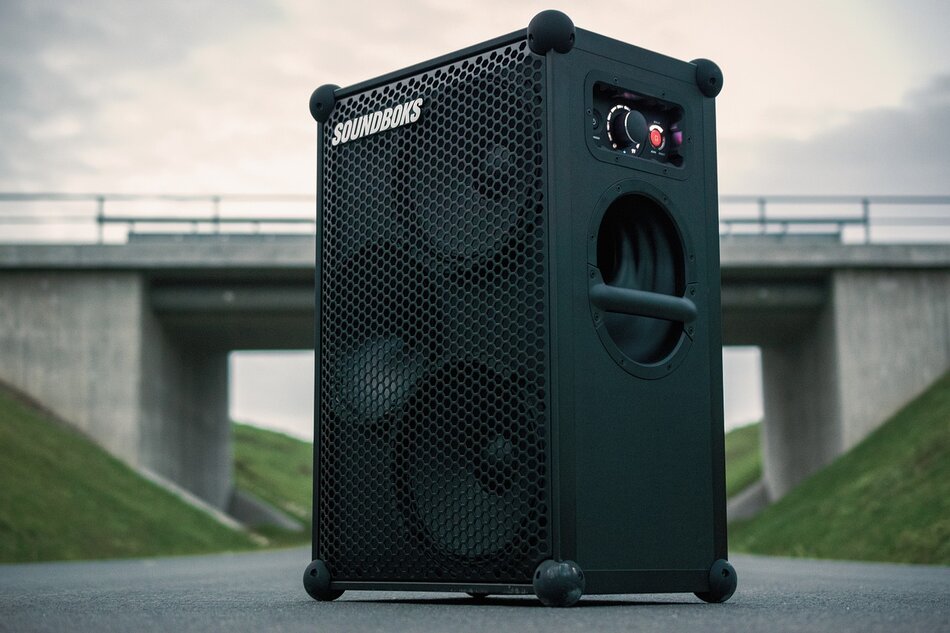
With so many speaker options available today, choosing the right type to play music through can be a difficult pick. PA speakers are, undoubtedly, the most popular type of speakers there are. But how do they sound? And are they good for music?
PA speakers are certainly good for music. Most modern PA speakers are full-range speakers. This means they can play all of the audible frequencies in music. However, to make them sound great, you need to apply proper EQ settings.
Many audio enthusiasts and audiophiles frown on PA speakers and think they actually sound bad, and you should probably never listen to music through PA speakers. However, after a few hours of research, here is what I found about the sound quality of PA speakers.
Table of Contents
Do PA Speakers Sound Good?
If you truly care about music, how great-sounding the speaker you are playing them through is definitely one of the factors to consider. PA speakers, however, don’t have an excellent reputation when it comes to sound quality. But besides all the critics, do PA speakers sound good?
Because PA speakers are designed to play loud audio to a large audience, they sound good when you are at a distance away from them. Also, you need to apply the proper EQ settings to PA speakers to make them sound their best.
PA speakers are usually long-throw speakers. This means they are designed to “throw” sound waves at a longer distance so that people away from the speakers can clearly hear the sound.
Usually, in concerts, churches, clubs, and the like, the audience are farther away from the speakers. So PA speakers are designed to project the sound far. For this reason, they actually sound better when you are a bit distant from them.
So, something to note is, if you are planning to use PA speakers in a small space where the audience will be close to the speakers, the audience won’t get the best listening experience.
This is one of the reasons why PA speakers are generally not used in a home audio system. That’s mainly because you’ll be quite close to your speakers in a living room, meaning you won’t get the best listening experience with PA speakers.
Secondly, by default, most PA speakers sound OK but not great. To make them sound excellent for wherever you are using them, you need to apply proper EQ settings to bring out the best possible sound.
And applying the right EQ settings for PA speakers is a skill that has to be learned and practiced. And that is a skill many casual music listeners don’t have
If you are using PA speakers to deliver speeches or playback speeches or podcasts, they will sound good with minimal EQ settings. However, if you are playing music, whether pre-recorded or live music, through PA speakers, you need to learn how to tweak the EQ settings so that the speakers sound great wherever you are using them.
Why PA Speakers Are Sometimes Not Ideal for Music
There is no denying the fact that PA speakers are widely used for playing music. And in many cases, there are the best types of speakers to use.
However, they are not always the ideal choice for music, especially for home use.
That’s because they are made to sound their best when they are playing loud. When you use them in your living room, you’ll probably not play them loud enough. You wouldn’t want to disturb the entire house and your neighbors.
Also, just as we’ve talked about, you need to properly tweak the EQ settings to make PA speakers sound great. And many casual listeners may end up ruining the sound quality of their speakers if they try to do so.
So, although PA speakers can be used at home, I wouldn’t recommend you do so.
The best type of speakers to use in your home audio system are Hi-Fi speakers. These speakers are usually designed for small spaces such as the living room or hall. And they usually have a great frequency response. So they sound decent and sometimes very excellent in different rooms.
I wrote a detailed comparison guide between PA speakers and Hi-Fi speakers. Feel free to check it out.
When to Use PA Speakers for Music
PA speakers are uniquely made to project a sound to a large audience. With this in mind, here are some locations where it’s ideal to use PA speakers for music.
- Clubs
- Concerts
- Picnics
- Parties
- Conferences
- Churches
- Schools
- Stadiums
- All outdoor events
These are just a few examples. This should give you an idea of the situations where it’s ideal to use PA speakers.
Do PA Speakers Have Good Bass?
Of course, we all know how important bass is in music. Music just doesn’t feel good without a good punch of bass, which is why we should definitely consider the bass a speaker outputs when we’re considering using them to listen to music.
But do PA speakers have good bass? Or you’ll probably get a much better bass response with a different type of speaker.
Not every PA speaker has good bass. Smaller PA speakers lack the ability to produce low bass frequencies. However, there are full-range PA speakers that have great and decent-sounding bass.
Here is a brief description of how speakers work. For speakers to generate sound, they need to push air. The more the air it pushes, the louder it plays.
Low frequencies (or bass) are much quieter and harder to hear by humans. So for bass to be audible, the speakers need to be able to push high volumes of air.
I explained the concept of how speakers play bass, in detail, in this article. And you should check it out to learn more. Let’s continue.
Smaller speakers have small speaker cones with a small diameter. So they are incapable of pushing as much air needed to produce bass audibly. And this is the primary reason why smaller speakers, in general, don’t have good bass.
However, there are a few exceptions. As technology improved, speaker manufacturers have found innovative ways to improve the bass response of smaller speakers. This means you can get very decent-sounding bass out of these speakers.
Commercial Hi-Fi (or high-fidelity) speakers, although not very large, are able to produce a good amount of bass that sounds really great. Hi-Fi speaker manufacturers use technologies such as Horn-Loading and Reflex Ports to improve the bass response of their speakers. Explaining these two concepts is well beyond the scope of this article.
This is a technology that PA speaker manufacturers have not widely adopted. Hence, smaller PA speakers tend to lack bass. So, it’s always advisable to get a subwoofer for small PA speakers to provide the bass you need.
However, if you are looking to purchase PA speakers that are good for music and have incredible-sounding bass, you should definitely consider full-range PA speakers.
But what exactly are full-range PA speakers? Glad you asked.
Full-range speakers are speakers that are able to reproduce all audible frequencies in an audio signal. They can produce high-end, midrange, and low frequencies. This means, when you play music through them, it will reproduce all of the frequencies in the song.
Many modern PA speakers are full range. This means they don’t just have good high and midrange frequency response; they also have a very good-sounding bass. So that’s something worth noting.
One of the most sought-after PA speakers I would recommend is the Alto Professional TS310 Powered PA Speaker (Amazon). This is a powered PA speaker, so it has a built-in amplifier perfectly matched to the speakers.
You can also plug in two mics or musical instruments directly into this PA speaker and mix them together. That’s because it has a two-channel mixer built-in as well.
What makes this great for music is that it has two drivers built-in — a low-frequency driver that delivers excellent-sounding bass and a high-frequency driver to handle all the midrange and high frequencies.
Conclusion
PA speakers are widely used for playing music, both pre-recorded and live music. So they are certainly good for music. They sound good when you are playing them loud, and you are a bit distant from them. So they are great for outdoor events, conferences, concerts, and more.
However, they are not ideal for home use. That’s because you can’t play PA speakers loud enough at home.
And also, to make PA speakers sound even better, it’s essential to apply proper EQ settings that will make them sound good where you are using them.

Hi, I’m Raymond. A keyboard player, music producer, and writer. And I’m also the founder of this blog. As someone who has been working with several audio and music equipment and different musicians for many years, my goal is to answer all your questions on music and equipment, as well as the latest music software and technology. For more info, check out my about me page

